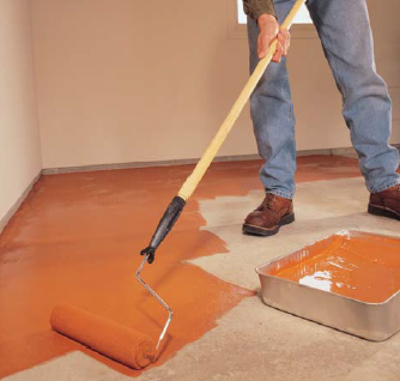We may receive a commission when you use our affiliate links. However, this does not impact our recommendations.

Q: I just moved into an old house and will be setting up shop in the basement. The concrete floor is really dark and I would like to lighten it up before I move the machines in. What durable finish can I use?
A: You have several options, but we like water-based concrete stain the best. You can get it in a variety of colors, including white. It’s easier to work with than an oil-based floor paint and doesn’t give off dangerous fumes as does epoxy paint. Concrete stain won’t peel or chip off when you move your machines around because it penetrates the surface. Paint forms a film on top.
Before staining, the concrete must be cleaned thoroughly and etched to make it porous. Clean your floor with TSP (trisodium phosphate). If your state bans TSP ask a paint supplier for a substitute. Clean oil or grease stains with a degreaser. Thoroughly rinse away all the residue.
Etching abrades the surface of the concrete and allows the stain to deeply penetrate. Use either muriatic acid or phosphoric acid (your hardware store should have these) as directed on the label.
Acids must be handled with care. Wear full-wrap goggles, rubber gloves and old clothes while cleaning and etching. Dilute the acid by adding it to the water (not the other way around!). Make sure the area is well ventilated.
Triple-rinse the floor by spraying with a garden hose and brushing with a stiff broom; then allow the surface to dry completely before applying the stain.
Mix all the stain you plan to use in a large bucket and spread it with a 1/4-in.-nap roller in 3-ft.by 3-ft. sections. Cut in around the walls with a synthetic brush. Wait 24 hours before using the floor or putting on a second coat.
Here are some supplies and tools we find essential in our everyday work around the shop. We may receive a commission from sales referred by our links; however, we have carefully selected these products for their usefulness and quality.









Two or three years ago I became dissatisfied with the concrete floor in my workshop which was cold in the winter, produced concrete dust when trafficked and did nothing for any sharp tool which might be dropped on it. As a retired builder I knew that painting the floor would be only a temporary solution to the dusting problem and would not help the other downsides. Resin floor coating would produce a great hardwearing and easy clean surface but is expensive and really needs to be laid by a professional and would still be cold and hard on the feet and tools.
I chanced on the answer (I can’t remember how) which was the perfect solution – interlocking vynil tiles.
These are made in the UK by a company called Ecotile, they come in grades to suit different requirements, are easy to lay and half the price of resin floor coatings. They are also easy on the feet, warm and brush clean with minimal effort. The grade I used was E500/6 which is a 6mm thick tile 500mm square with a slightly textured finish. They can be laid direct on your existing floor and cut to fit around the walls and any other features with a hand saw or even a bench saw with care. My heavy machines move on it without any effort too.
Look on their web site to see what they are like and if you cannot find a local supplier in the US maybe you have a similar product made over there.
John